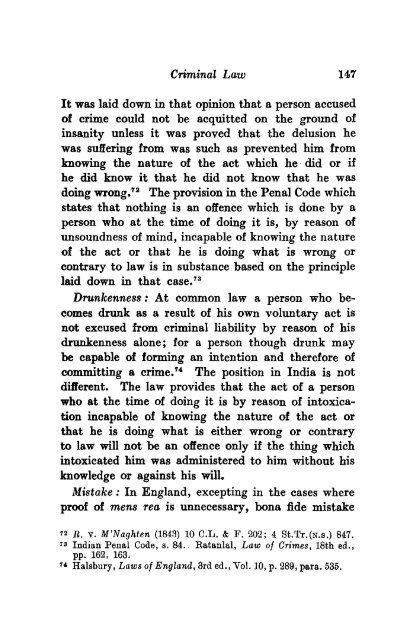The Common Law in India - College of Social Sciences and ...
The Common Law in India - College of Social Sciences and ...
The Common Law in India - College of Social Sciences and ...
- No tags were found...
You also want an ePaper? Increase the reach of your titles
YUMPU automatically turns print PDFs into web optimized ePapers that Google loves.
Crim<strong>in</strong>al <strong>Law</strong> 147It was laid down <strong>in</strong> that op<strong>in</strong>ion that a person accused<strong>of</strong> crime could not be acquitted on the ground <strong>of</strong><strong>in</strong>sanity unless it was proved that the delusion hewas suffer<strong>in</strong>g from was such as prevented him fromknow<strong>in</strong>g the nature <strong>of</strong> the act which he did or ifhe did know it that he did not know that he wasdo<strong>in</strong>g wrong. 72 <strong>The</strong> provision <strong>in</strong> the Penal Code whichstates that noth<strong>in</strong>g is an <strong>of</strong>fence which is done by aperson who at the time <strong>of</strong> do<strong>in</strong>g it is, by reason <strong>of</strong>unsoundness <strong>of</strong> m<strong>in</strong>d, <strong>in</strong>capable <strong>of</strong> know<strong>in</strong>g the nature<strong>of</strong> the act or that he is do<strong>in</strong>g what is wrong orcontrary to law is <strong>in</strong> substance based on the pr<strong>in</strong>ciplelaid down <strong>in</strong> that case. 73Drunkenness: At common law a person who becomesdrunk as a result <strong>of</strong> his own voluntary act isnot excused from crim<strong>in</strong>al liability by reason <strong>of</strong> hisdrunkenness alone; for a person though drunk maybe capable <strong>of</strong> form<strong>in</strong>g an <strong>in</strong>tention <strong>and</strong> therefore <strong>of</strong>committ<strong>in</strong>g a crime." <strong>The</strong> position <strong>in</strong> <strong>India</strong> is notdifferent. <strong>The</strong> law provides that the act <strong>of</strong> a personwho at the time <strong>of</strong> do<strong>in</strong>g it is by reason <strong>of</strong> <strong>in</strong>toxication<strong>in</strong>capable <strong>of</strong> know<strong>in</strong>g the nature <strong>of</strong> the act orthat he is do<strong>in</strong>g what is either wrong or contraryto law will not be an <strong>of</strong>fence only if the th<strong>in</strong>g which<strong>in</strong>toxicated him was adm<strong>in</strong>istered to him without hisknowledge or aga<strong>in</strong>st his will.Mistake : In Engl<strong>and</strong>, except<strong>in</strong>g <strong>in</strong> the cases wherepro<strong>of</strong> <strong>of</strong> mens rea is unnecessary, bona fide mistake" B. v. M'Naghten (1843) 10 C.L. & P. 202; 4 St.Tr.(u.s.) 847.73<strong>India</strong>n Penal Code, s. 84. Eatanlal, <strong>Law</strong> <strong>of</strong> Crimes, 18th ed.,pp. 162, 163.74Halsbury, Laics <strong>of</strong> Engl<strong>and</strong>, 3rd ed., Vol. 10, p. 289, para. 535.
















